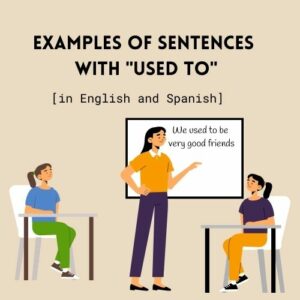“Used to” is a construction in English that appears in three different contexts depending on whether it is used as the main verb (used to) or as part of constructions with the verbs be (be used to) and get (get used to).
- When used as the main verb, “used to” translates as “soler” in Spanish. For example: Cuando era niño/a, solía tocar el piano todos los días. / When I was a child, I used to play the piano every day.
- In the construction “be used to,” it translates as “estar acostumbrado/a” in Spanish. For example: Yo estoy acostumbrado/a a leer novelas largas. / I am used to reading long novels.
- In the construction “get used to,” it translates as “acostumbrarse” in Spanish. For example: Me acostumbré a trabajar en dos empleos. / I got used to working two jobs.

Used to: habits in the past
Table of Contents
“Used to” is a construction in English that is used to express habitual actions and states in the past that no longer occur in the present. It translates as “yo solía“.
For example: Yo solía jugar al hockey cuando era niño/a, pero ahora juego al fútbol. / I used to play hockey when I was a child, but now I play soccer.
The translation of “used to” is “solía” in Spanish. “Used to” + infinitive can also be translated as “jugaba, viajaba, comía” since it is equivalent to the imperfect tense in Spanish.
Sentences with “used to” usually include adverbs of time such as “when I was a child, in the past, as a child, many years ago.”
For example: Cuando era niño/a, solía leer libros de fantasía. / When I was a child, I used to read fantasy books.

Sentence structure with used to (solía)
To form the construction used to (both in affirmative and negative sentences and questions) the verb is conjugated use in past: used, didn’t use.
Affirmative sentences with used to (solía)
The structure of affirmative sentences in English is:
subject + used to + base form of the verb
For example: We used to travel to the beach every summer. / Solíamos viajar a la playa todos los veranos.
Other examples:
- He used to play the piano when he was younger. / Él solía tocar el piano cuando era más joven.
- She used to live in Mexico. / Ella solía vivir en México.

Negative sentences with used to
The structure of negative sentences in English is:
subject + did not / didn’t + use to + base form of the verb
For example: When I was a child, I didn’t use to watch a lot of television. / Cuando era niño/a, no solía ver mucha televisión.
Careful: In negative sentences, use “use” with “didn’t” (and not “used”).
Other examples:
- They didn’t use to eat spicy food. / Ellos no solían comer comida picante.
- She didn’t use to speak Spanish fluently. / Ella no solía hablar español con fluidez.
Interrogative sentences with used to
The structure of interrogative sentences in English is:
did + subject + use to + base form of the verb + ?
For example: Did you use to live on the same street as a child? / ¿Solías vivir en la misma calle cuando eras niño/a?
To keep in mind:
“Used to” always refers to habits in the past. It cannot be used in connection with the present. For example: Yo used to be very tidy. (refers to the past). If you want to talk about the present, you must say “I’m usually very tidy.” (And not: “I use to be very tidy.”)
Both “used to” as a verb in the simple past are correct to express past habits and actions. For example: Yo used to play (played) volleyball as a kid. / Yo solía jugar al voleibol cuando era niño/a.
“Would + infinitive” can be used in the same contexts as “used to” to express habitual actions in the past, especially when they are part of a story. For example: We would spend the afternoon talking for hours on end. / Pasábamos las tardes hablando durante horas.

Be used to: Estar acostumbrado/a
“Be used to” is a construction in English that is used to express being accustomed to something or doing something.
For example: Estoy acostumbrado/a a trabajar duro. / I am used to working hard.
The structure of “be used to” is:
subject + be + used to + noun/gerund/infinitive
Other examples:
- She is used to living alone. / Ella está acostumbrada a vivir sola.
- We are used to speaking Spanish in class. / Estamos acostumbrados a hablar español en clase.
Structure of be used to
The construction “be used to” in English follows the pattern of: subject + conjugated form of the verb “to be” + used to + noun or gerund (-ing form)
In the “be used to” construction, the verb “to be” is conjugated according to the appropriate tense (unlike “used to,” which remains unchanged in this construction).
For example: I am used to traveling. / Yo estoy acostumbrado/a a viajar. He was used to traveling. / Él estaba acostumbrado/a a viajar.
In the “be used to” construction, the word “to” is followed by a noun or a gerund (-ing form) and not an infinitive (as in most English constructions).
For example: I am used to driving long distances. / Estoy acostumbrado/a a manejar largas distancias. He is used to studying late at night. / Él está acostumbrado/a a estudiar hasta tarde en la noche.
Additional examples: I am used to cooking my own meals. / Estoy acostumbrado/a a cocinar mis propias comidas. We weren’t used to those types of questions. / No estábamos acostumbrados a ese tipo de preguntas.

Get used to: Acostumbrarse
“Get used to” is a construction in English that is used to express the process of getting accustomed to something or doing something.
For example: Me acostumbré a vivir en la nueva ciudad fácilmente. / I got used to living in the new city easily.
The structure of “get used to” is: subject + get + used to + noun/gerund
Other examples:
- She got used to speaking Spanish fluently. / Ella se acostumbró a hablar español con fluidez.
- We are getting used to the new schedule. / Nos estamos acostumbrando al nuevo horario.
Structure of get used to
The construction “get used to” in English follows the pattern of: subject + conjugated form of the verb “to get” + used to + gerund (-ing form)
In the “get used to” construction, the verb “to get” is conjugated according to the appropriate tense (unlike “used to,” which remains unchanged in this construction).
For example: I got used to traveling abroad in my new job. / Me acostumbré a viajar al extranjero en mi nuevo trabajo. He will get used to traveling for business every week. / Él se acostumbrará a viajar por negocios todas las semanas.
In the “get used to” construction, the word “to” is followed by a noun or a gerund (-ing form) and not an infinitive (as in most English constructions).
For example: I have gotten used to being far from my family. / Me he acostumbrado a estar lejos de mi familia. We get used to the noise. / Nos acostumbramos al ruido.
Additional examples: I haven’t gotten used to living in this small apartment yet. / Aún no me he acostumbrado a vivir en este apartamento pequeño.
Examples of sentences with used to
- We used to be very good friends. Solíamos ser muy buenos amigos.
- She used to paint when she was a student. Ella solía pintar cuando era estudiante.
- The team used to be united. El equipo solía estar unido.
- We used to visit my grandmother every Sunday. Solíamos visitar a mi abuela todos los domingos.
- This used to be a supermarket. Esto solía ser un supermercado.
- The car used to work fine. El coche solía funcionar bien.
- Did you use to play golf? ¿Solías jugar al golf?
- I didn’t use to listen to music when we were friends. No solía escuchar música cuando éramos amigos.
- We didn’t use to have cats when I was a child. No solíamos tener gatos cuando era niño.
- They used to go swimming every day. Solían ir a nadar todos los días.
- He used to wake up at six in the morning when he was a baby. Solía despertarse a las seis de la mañana cuando era bebé.
- Back then, I didn’t use to speak French. En aquel entonces, no solía hablar francés.
- He used to be a good student. Solía ser un buen estudiante.
- Before consulting the doctor, he used to feel tired all the time. Antes de consultar al médico, solía sentirse cansado todo el tiempo.
- Did you use to play the guitar? ¿Solías tocar la guitarra?
- She didn’t use to get good grades. Ella no solía sacar buenas notas.
- Did your father use to take you to the zoo? ¿Tu padre solía llevarte al zoológico?
- Before, we didn’t use to go to the beach often. Antes, no solíamos ir a la playa con frecuencia.
- The building used to be very exclusive. El edificio solía ser muy exclusivo.
- They used to live in a big city. Solían vivir en una ciudad grande.
- My sister used to collect stamps as a child, but she doesn’t anymore. Mi hermana solía coleccionar estampillas cuando era niña, pero ya no lo hace.
- My father used to love ice cream. A mi padre le encantaba el helado.
- My brother didn’t use to like sports many years ago. A mi hermano no solía gustarle los deportes hace muchos años.
- Before, Anna didn’t use to be spoiled. Antes, Anna no solía ser consentida.
- Did Sam use to write poems when he was in elementary school? ¿Sam solía escribir poemas cuando estaba en la escuela primaria?
- Did your sister use to study a lot when she was in college? ¿Tu hermana solía estudiar mucho cuando estaba en la universidad?
Examples of sentences with be used to
- We are used to meeting new people. Estamos acostumbrados a conocer gente nueva.
- They are used to receiving bad grades. Ellos están acostumbrados a recibir malas calificaciones.
- He is used to success. Está acostumbrado al éxito.
- Back then, I was used to walking in the snow. En aquel entonces, estaba acostumbrado a caminar en la nieve.
- She was not used to luxury hotels. Ella no estaba acostumbrada a hoteles de lujo.
- We were not used to the heat. No estábamos acostumbrados al calor.
- Are you used to using the seatbelt? ¿Estás acostumbrado/a a usar el cinturón de seguridad?
- Are you used to cooking for big groups? ¿Estás acostumbrado/a a cocinar para grupos grandes?
- I have’s not used to failing tests. He is not used to failing exams. No está acostumbrado a fallar exámenes.
- We are used to having coffee every morning. Estamos acostumbrados a tomar café todas las mañanas.
- She’s not used to noisy children. Ella no está acostumbrada a niños ruidosos.
- We were not used to visiting museums. No estábamos acostumbrados a visitar museos.
- I’m not used to staying in bed. No estoy acostumbrado/a a quedarme en la cama.
- They are used to hard training. Ellos están acostumbrados a entrenamientos difíciles.
- Is she used to being with children? ¿Está acostumbrada a estar con niños?
Examples of sentences with get used to
- You will get used to the cold. Te acostumbrarás al frío.
- I’m getting used to life in the city. Me estoy acostumbrando a la vida en la ciudad.
- They got used to living here very quickly. Se acostumbraron a vivir aquí muy rápido.
- Are you getting used to the new job? ¿Te estás acostumbrando al nuevo trabajo?
- She never got used to being a grandmother. Nunca se acostumbró a ser abuela.
- It’s hard to get used to all the new technology. Es difícil acostumbrarse a toda la nueva tecnología.
- Will they get used to the new regulations? ¿Se acostumbrarán a las nuevas regulaciones?
- If you plan to live in England, you should get used to driving on the left. Si planeas vivir en Inglaterra, debes acostumbrarte a conducir por la izquierda.
- You will get used to his black humor. Te acostumbrarás a su humor negro.
- He will get used to his little brother. Se acostumbrará a su hermanito.
- No one can get used to this horrible place. Nadie puede acostumbrarse a este lugar horrible.
- Did you get used to the new shoes? ¿Te acostumbraste a los zapatos nuevos?
- He’s getting used to following the rules. Se está acostumbrando a seguir las reglas.
- You won’t get used to being retired. No te acostumbrarás a estar jubilado.
- I’ve gotten used to spicy food. Me he acostumbrado a la comida picante.